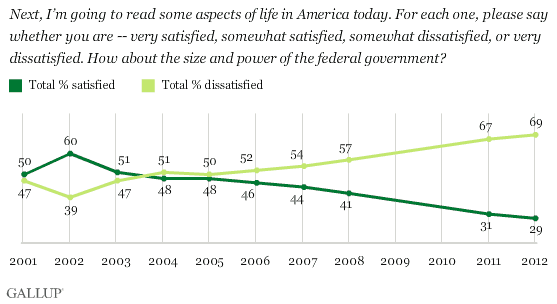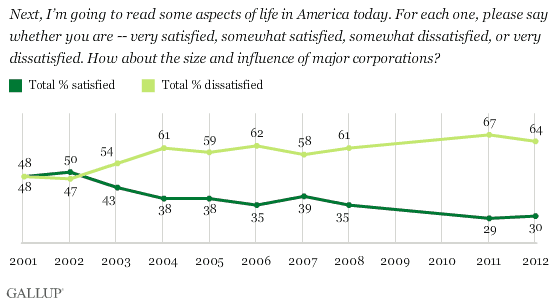PRINCETON, NJ -- Americans' satisfaction with the size and power of the federal government is at a record-low 29% and their satisfaction with the size and influence of major corporations remains near the all-time low at 30% -- making both highly susceptible targets for politicians and presidential candidates in this election year.
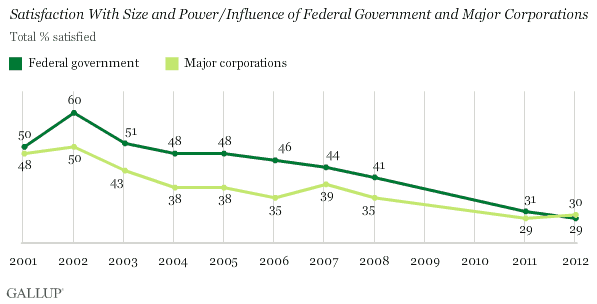
Gallup began asking these questions in its annual Mood of the Nation surveys in 2001. About half of Americans in January 2001 were satisfied with the size of the federal government and of major corporations, and satisfaction with both has generally been declining since. Summaries of the complete trends are on page 2.
Republicans Anti-Government, Democrats Anti-Corporation
Politicians and political groups have criticized the size and influence of both the federal government and big corporations this year, with the former mostly a focus of Republican attacks, and the latter a Democratic target. Rank-and-file Republicans' and Democrats' views of these two entities align with the partisan nature of these political attacks.
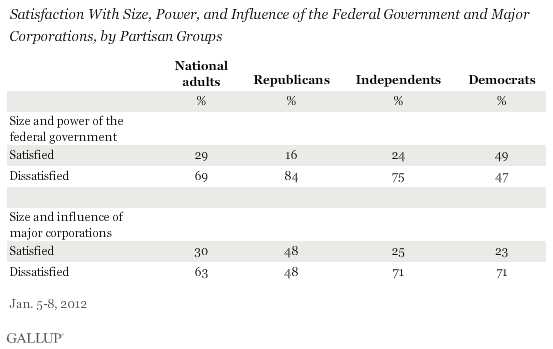
Republicans in particular are displeased with the size and power of the federal government, with 16% satisfied and 84% dissatisfied. Democrats are more positive about the federal government, but hardly overwhelmingly so, with 49% satisfied and 47% dissatisfied. The politically crucial group of independents is slightly more negative than the national average.
Democrats, as would be expected, are disproportionately displeased with the size and influence of major corporations, with 71% dissatisfied and 23% satisfied. Republicans break even in their views of major corporations, with 48% satisfied and the same percentage dissatisfied. Independents -- as was the case in their views of the federal government -- are slightly more negative than the national average.
Most Americans who are dissatisfied with the size and influence of major corporations say, in response to a follow-up question, that they would like to see corporations have less influence.
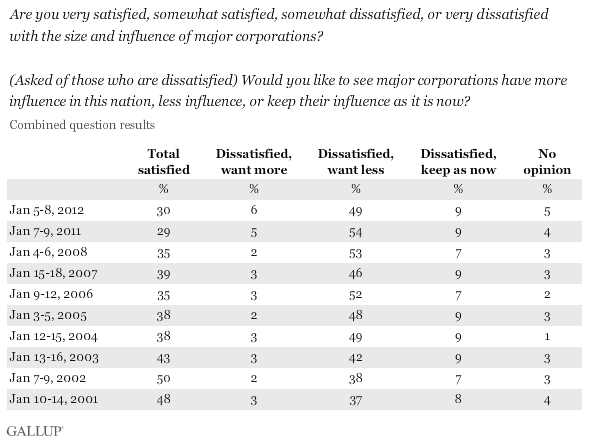
Implications
These results suggest that it's a case of "pick your poison" in the political arena when it comes to big business and big government -- with Americans quite dissatisfied with the size, power, and influence of both.
It is therefore not surprising as a result that politicians and political groups have made these entities the focal points of criticism and political posturing in this election cycle. President Obama and Democratic leaders have spoken against what they perceive to be the negative influence of the power of major corporations, as have the highly visible, albeit fading, "Occupy" movements across the country. Republicans, particularly including the Republican presidential candidates and the Tea Party movement, have targeted the size and power of the federal government.
Taken in the aggregate, both of these big entities appear to be susceptible targets. Republicans are much less negative than average about major corporations. Democrats are much less negative about the federal government. Still, at least half of both of these political groups remain dissatisfied with the federal government and major corporations, signaling some appetite for change among Americans of all political persuasions.
Politicians and other critics therefore run some risk when they target one of these two unpopular entities while appearing to vindicate or support the other. President Obama's strategists have apparently already recognized this, and Obama recently announced that he plans on reducing the size of six government agencies by consolidating them. Republican presidential candidates may at some point find it useful, likewise, to publicly take positions favorable toward reducing the power of major corporations.
Survey Methods
Results for this Gallup poll are based on telephone interviews conducted Jan. 5-8, 2012, with a random sample of 1,011 adults, aged 18 and older, living in all 50 U.S. states and the District of Columbia.
For results based on the total sample of national adults, one can say with 95% confidence that the maximum margin of sampling error is ±4 percentage points.
Interviews are conducted with respondents on landline telephones and cellular phones, with interviews conducted in Spanish for respondents who are primarily Spanish-speaking. Each sample includes a minimum quota of 400 cell phone respondents and 600 landline respondents per 1,000 national adults, with additional minimum quotas among landline respondents by region. Landline telephone numbers are chosen at random among listed telephone numbers. Cell phone numbers are selected using random-digit-dial methods. Landline respondents are chosen at random within each household on the basis of which member had the most recent birthday.
Samples are weighted by gender, age, race, Hispanic ethnicity, education, region, adults in the household, and phone status (cell phone only/landline only/both, cell phone mostly, and having an unlisted landline number). Demographic weighting targets are based on the March 2011 Current Population Survey figures for the aged 18 and older non-institutionalized population living in U.S. telephone households. All reported margins of sampling error include the computed design effects for weighting and sample design.
In addition to sampling error, question wording and practical difficulties in conducting surveys can introduce error or bias into the findings of public opinion polls.
View methodology, full question results, and trend data.
For more details on Gallup's polling methodology, visit www.gallup.com.
